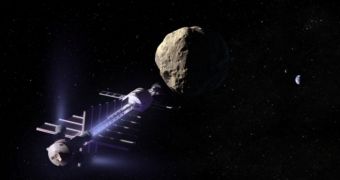Ever since modern astronomy began, those studying space have always been concerned about possible meteorites, meteors, asteroids or comets that could enter a collision course with our planet. With the example of what happened to the dinosaurs, and with five extinction events already in the bag, it stands to reason that our civilization could not withstand the long-term effects of an extremely powerful celestial body slamming into the Earth's surface. Now, experts are in the midst of analyzing two options of preventing such a faith, which were selected from a host of other propositions, Wired reports.
The first method is undoubtedly based on strength. Its proponents say that the only thing we need to do, when faced with an imminent threat from an incoming celestial body, is to prepare our biggest weapons and direct them to the threat. Large Intercontinental Ballistic Missiles (ICBM), or other nuclear weapons, could deal a significant blow into a space rock and force it off course. The main disadvantage to this method is that there is always the risk of the comet or asteroid fragmenting, and the Earth being impacted in multiple points.
The second solution is a bit more “diplomatic.” It refers to using a more delicate approach to averting possible impacts. It implies knowing of the threat years in advance, and relies on using a “space tug” to gently kick the rock off its original course. This would take years, and the method is therefore not suitable to be used as a last resort, or when running out of time. Though it's slow acting, it has the advantage that it would set the dangerous space rock on a different course, one that would never bring it close to our planet again.
Both methods require international cooperation to the greatest extent, experts say. “What deflection technologies are OK and who says they are OK? Who accepts liability? How do you decide that it’s OK to endanger the people of Venezuela or the people of Kazakhstan?” former astronaut Rusty Schweickart, the leader of The B612 Foundation, asks. He argues that asteroid deflection is a very sensitive matter of geopolitics, and that things need to be straightened out well in advance of someone accidentally discovering a dangerous cosmic object heading this way.

 14 DAY TRIAL //
14 DAY TRIAL //